HEALTH + FITNESS
Beat the Sniffles: Your Ultimate Cold and Flu Survival Guide
Published
3 months agoon
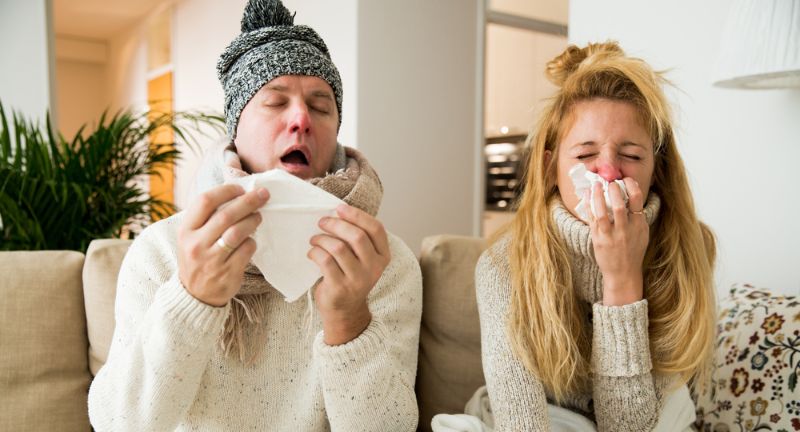
Shutterstock
Winter often brings festive cheer, but it also ushers in cold and flu season, making it crucial to prioritize your health. Staying cold and flu-free doesn’t require drastic measures—just a series of thoughtful habits and precautions. From boosting your immune system with proper nutrition to adopting simple hygiene practices, there are many ways to protect yourself and your loved ones. With these easy and effective steps, you can enjoy a healthier, more comfortable winter season. Let’s dive into the 25 best ways to keep those sniffles at bay and maintain your wellness all season long.
Get Vaccinated

Shutterstock
Getting vaccinated is one of the most effective ways to protect yourself from the flu. The flu vaccine is designed to reduce the severity of symptoms and decrease the risk of complications if you do get sick. Vaccination is particularly important for vulnerable populations, such as the elderly, pregnant women, and those with chronic conditions. It’s a simple step you can take to ensure a healthier winter season for yourself and those around you.
Wash Your Hands Frequently

Shutterstock
Washing your hands often with soap and warm water is a powerful defense against colds and flu. Make it a habit to scrub for at least 20 seconds, ensuring you clean between your fingers and under your nails. This practice is especially important after visiting public spaces, handling money, or using shared surfaces. Clean hands prevent germs from spreading to your face and into your system.
Use Hand Sanitizer

Shutterstock
When soap and water aren’t available, hand sanitizer becomes a convenient alternative. Use an alcohol-based sanitizer with at least 60% alcohol to effectively kill germs. Keep a small bottle handy for use in crowded areas, such as public transport or shopping malls. Regular use ensures that germs picked up on the go don’t make their way into your system.
Avoid Touching Your Face

Shutterstock
Resist the urge to touch your face, as this is one of the easiest ways for germs to enter your body. Your hands come into contact with countless surfaces, making them potential carriers of viruses. By avoiding touching your eyes, nose, and mouth, you reduce the chance of transferring harmful pathogens. This simple habit can go a long way in keeping you cold and flu-free.
Maintain a Healthy Diet

Shutterstock
Eating a balanced diet rich in vitamins and minerals helps to bolster your immune system. Include plenty of fruits, vegetables, whole grains, and lean proteins in your meals to provide your body with essential nutrients. Foods high in antioxidants, such as berries and spinach, are particularly beneficial. A healthy diet not only reduces your risk of illness but also aids in faster recovery if you do catch a cold or the flu.
Stay Hydrated

Shutterstock
Drinking enough water daily is vital for maintaining overall health and keeping your immune system in top shape. Proper hydration helps your body flush out toxins and supports the health of mucous membranes, your body’s first line of defense against pathogens. Carry a reusable water bottle and sip throughout the day to meet your hydration needs. Staying hydrated is a simple yet powerful way to protect against winter illnesses.
Prioritize Sleep

Shutterstock
Adequate sleep is critical for a strong immune system. Aim for 7-9 hours of quality rest each night to give your body time to repair and recharge. Poor sleep can weaken your immunity, making you more vulnerable to colds and the flu. Establish a bedtime routine and create a comfortable sleeping environment to ensure restful nights throughout the winter season.
Exercise Regularly

Shutterstock
Regular physical activity helps improve circulation and boosts your immune system. Moderate exercises like walking, yoga, or swimming can enhance your body’s ability to fight infections. Even during the winter, try to stay active by working out indoors or bundling up for outdoor activities. Exercise not only prevents illness but also improves your overall mood and energy levels.
Reduce Stress

Shutterstock
Chronic stress can suppress your immune response, leaving you more susceptible to illness. Combat stress by incorporating relaxation techniques like deep breathing, meditation, or yoga into your daily routine. Taking time for self-care, hobbies, or simply unwinding with loved ones can make a significant difference. Managing stress levels is crucial for staying healthy and flu-free during the winter months.
Keep Your Home Clean

Shutterstock
A clean home is essential to preventing the spread of germs during cold and flu season. Disinfect high-touch surfaces such as doorknobs, light switches, and remote controls regularly. Use household cleaners or wipes designed to kill bacteria and viruses effectively. Keeping your living space clean minimizes your exposure to harmful pathogens, protecting you and your family.
Ventilate Your Home

Shutterstock
Fresh air circulation in your home helps reduce the buildup of indoor germs and bacteria. Even in winter, open windows for a few minutes daily to let in fresh air. Proper ventilation also prevents the air from becoming too dry, which can irritate respiratory passages. This simple habit keeps your environment healthier and less prone to harboring germs.
Practice Good Respiratory Hygiene
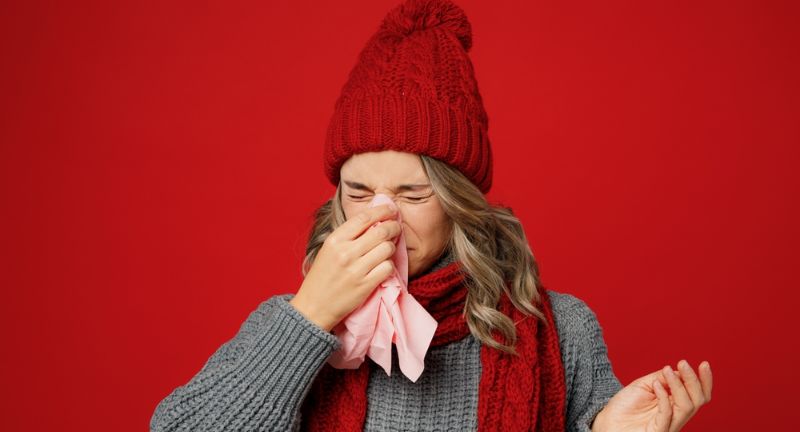
Shutterstock
Covering your mouth and nose when you cough or sneeze is crucial to containing the spread of germs. Use a tissue and dispose of it immediately, or cough into your elbow if a tissue isn’t available. Make it a habit to wash your hands after coughing or sneezing to avoid transferring germs to surfaces. Practicing good respiratory hygiene is a simple way to protect yourself and those around you.
Avoid Close Contact with Sick People

Shutterstock
Minimizing contact with individuals who are visibly ill is a straightforward way to reduce your risk of getting sick. Keep a safe distance, especially in crowded places, to avoid inhaling airborne particles. Politely excuse yourself if someone nearby is coughing or sneezing frequently. By staying mindful of your proximity to sick individuals, you lower your chances of exposure to cold and flu viruses.
Stay Warm

Shutterstock
Dressing appropriately for the weather helps your body conserve energy for fighting off infections. Wear layers and ensure your head, hands, and feet are covered to retain heat. Cold exposure can stress your immune system, making it less effective at warding off illness. Staying warm not only keeps you comfortable but also supports your health during the chilly months.
Use a Humidifier

Shutterstock
Dry winter air can irritate your respiratory system, making you more susceptible to viruses. Using a humidifier adds moisture to the air, keeping your nasal passages and throat hydrated. Proper humidity levels in your home also prevent the drying out of mucous membranes, which act as a barrier against germs. Regularly clean your humidifier to prevent mold and bacteria buildup for optimal health benefits.
Take Immune-Boosting Supplements

Shutterstock
Consider supplements like vitamin C, vitamin D, and zinc to give your immune system an extra boost. These nutrients are essential for maintaining a healthy immune response and may be harder to get in sufficient amounts during winter. Always consult with a healthcare provider before starting new supplements. When paired with a healthy diet, they can provide added protection during cold and flu season.
Limit Alcohol and Caffeine

Shutterstock
Excessive alcohol and caffeine consumption can dehydrate your body, weakening your immune defenses. Opt for water, herbal teas, or hydrating drinks to keep your system functioning optimally. Moderation is key—enjoy your coffee or cocktail but balance it with hydration and nutritious food. By cutting back, you’ll support your body’s natural ability to fight off illness.
Avoid Smoking

Shutterstock
Smoking weakens your respiratory system, making it easier for viruses to take hold and cause illness. Quitting smoking or reducing exposure to secondhand smoke is one of the best ways to improve your health. Cigarette smoke damages the protective lining in your airways, leaving you more vulnerable to colds and the flu. Protect your lungs and immune system by steering clear of smoking.
Wear a Mask in Crowded Spaces

Shutterstock
Masks are an effective barrier against airborne germs, especially in crowded or poorly ventilated areas. Choose a comfortable mask that fits snugly over your nose and mouth. Wearing one during peak cold and flu season reduces your risk of exposure to viruses. It’s a simple precaution that can protect not just you but also others around you.
Practice Social Distancing

Shutterstock
Keeping a safe distance from others during winter reduces your exposure to contagious illnesses. In busy settings like public transport or events, try to maintain space whenever possible. Social distancing is particularly helpful if someone nearby is showing signs of illness, like coughing or sneezing. By being mindful of your surroundings, you can stay healthier throughout the season.
Know When to Stay Home
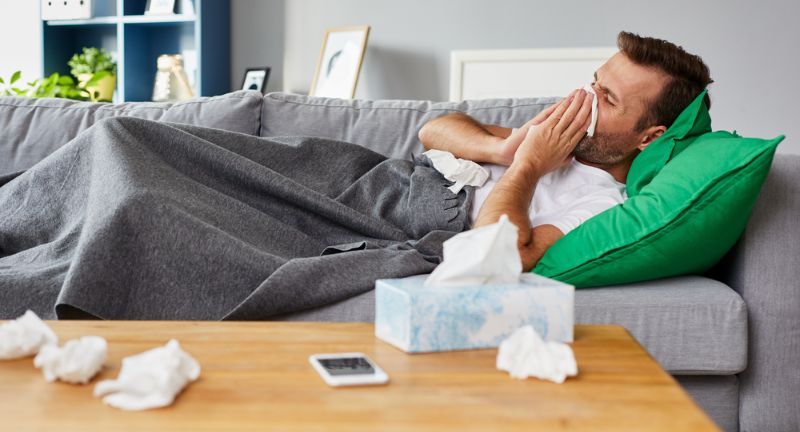
Shutterstock
If you feel under the weather, staying home is one of the most responsible things you can do. Avoiding work, school, or social gatherings prevents the spread of illness to others. Use the time to rest, hydrate, and recover fully before resuming your routine. Recognizing when to take a step back is key to a quick recovery and healthier community.
Keep Your Hands Off Shared Objects
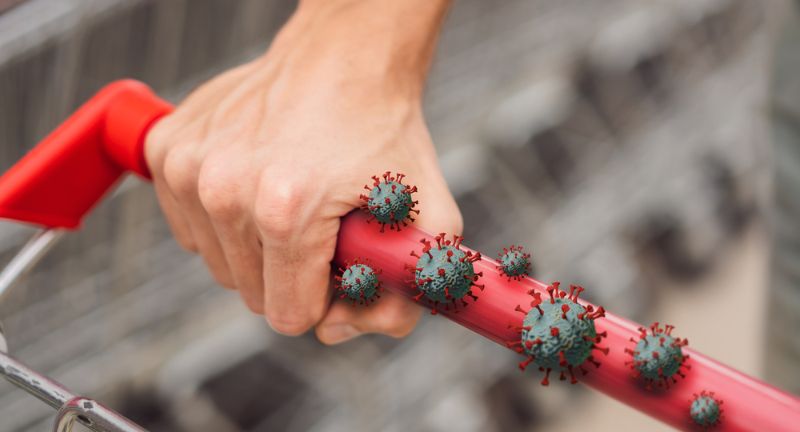
Shutterstock
Avoiding shared objects, such as handrails, elevator buttons, and shopping cart handles, can significantly reduce your exposure to germs. If touching these surfaces is unavoidable, use a tissue or your sleeve as a barrier. Wash your hands or use hand sanitizer immediately afterward to kill any lingering bacteria or viruses. Small precautions like these can help you stay healthier during cold and flu season.
Carry Your Own Pen

Shutterstock
Bringing your own pen is a simple way to minimize contact with germs, especially in places like banks, stores, or offices. Public pens are touched by countless people and can easily harbor bacteria and viruses. Keep a pen in your bag or pocket to use whenever you need to sign or fill out forms. It’s a small but effective step in your cold and flu prevention strategy.
Be Mindful of Travel Risks
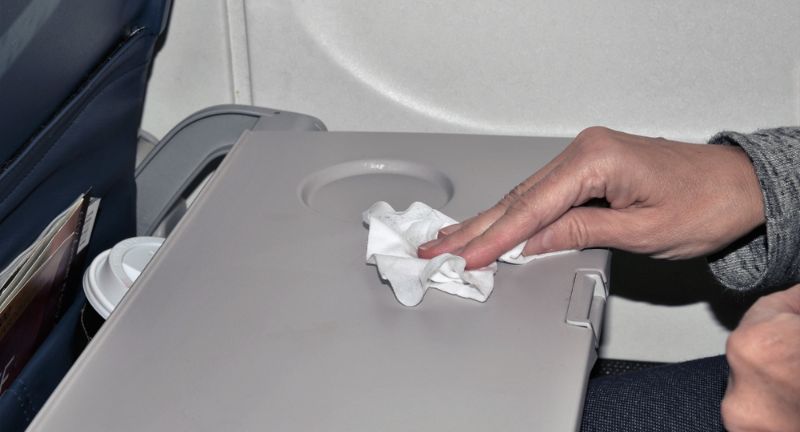
Shutterstock
Traveling during cold and flu season requires extra precautions to stay healthy. Wipe down surfaces like airplane trays, armrests, and seatbelt buckles with disinfectant wipes before use. Stay hydrated during your journey and avoid touching your face after handling shared surfaces. By staying vigilant, you can reduce your risk of catching an illness while on the move.
Stay Informed

Shutterstock
Keeping up with local health advisories and updates about seasonal illness outbreaks can help you make informed decisions. Knowledge about current flu trends or preventive measures in your area empowers you to take timely action. Follow reputable sources such as the CDC or WHO for the most accurate information. Staying informed allows you to adapt your habits and protect yourself effectively.
Conclusion

Shutterstock
Staying healthy during the cold and flu season is within your control with a combination of preventive measures and mindfulness. By incorporating these 25 simple yet effective steps into your daily routine, you can significantly reduce your risk of falling ill. Remember, protecting yourself not only benefits you but also helps safeguard those around you. Embrace these habits to make the most of the winter season without the discomfort of illness. Stay proactive, stay healthy, and enjoy all the joys that winter has to offer.
Related Topics:

More From Lifestylogy
-


Krispy Kreme Offering Free Doughnuts For a Year to Vaccinated…
-


New Study Links Mono to Multiple Sclerosis
-


24 Ways to Keep Your Eyes Healthy as You Age
-


AstraZeneca COVID Vaccine Trials to Resume
-


Why Maria Shriver Wants You to Put Your Phone Down
-


Dr. Oz Reveals 4 Ways to Strengthen Immune System
-


25 Global Food Trends That Will Continue Into 2025
-


Cheryl Burke Opens Up About Her Decision to Quit Drinking
-


FDA Investigating Hepatitis A Linked to Organic Strawberries